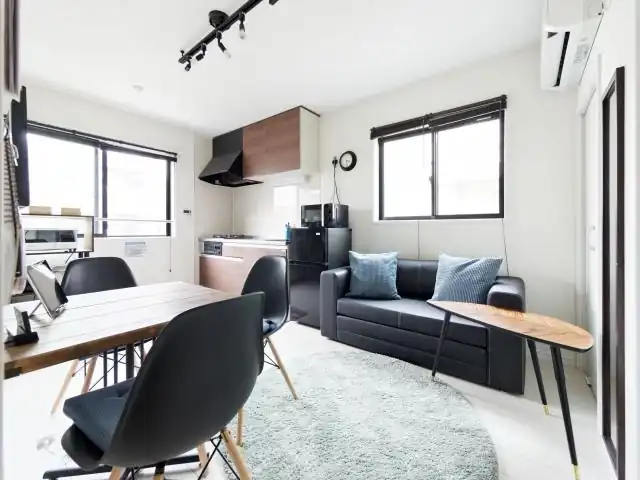Living in a sharehouse with multiple people is gaining attention because it can reduce living costs. Even though sharehouses are a great option to many people, there are also some downsides you should be aware of before choosing to move into one.
In this article, we will introduce the pros and cons of living in a sharehouse, as well as the characteristics of people who are suited for this style of living and those who are not. If you are considering moving into a sharehouse, please use this as a reference.
If you want to reduce your living costs, another great option for you would be moving into one of our Village House apartments. Please visit our website, to find your ideal apartment among over 1,000 rental properties all across Japan with rents starting from around 20,000 yen per month.
Advantages of living in a share house: Included utilities and more

Lower cost of living
One of the major advantages of living in a sharehouse is that rent and living costs are cheaper compared to living alone. Although it varies depending on the room size and facilities, the rent is generally offered at a lower price than a typical apartment or condominium. Additionally, most share houses charge a fixed rate for utilities and other essential services as part of the common service fee, so you can rest assured that the amount will not fluctuate.
Lower initial costs
Sharehouses significantly reduce initial costs. Typically, when renting a property, many initial costs are required such as a security deposit, key money, and agency fees.
On the other hand, well-managed share houses tend to have no security deposit or lower key money, making initial costs cheaper. Furthermore, share houses often come equipped with all the necessary furniture and appliances, so you can save money on moving costs as you won’t need to purchase new items
Expanding social connections among residents
Since there are common spaces in a sharehouse, it is easy for residents to communicate with each other. Living in a new place or living alone for the first time can be a little intimidating, but having friends nearby to consult with provides a sense of security and comfort.
Feeling secure with others around
A sharehouse is an environment where you are less likely to feel lonely, anxious, or isolated, which is common when living alone. If you feel like talking to someone, there’s usually someone in the common spaces, making it easier to feel connected with others. If by any chance you get sick, you can ask other residents for help, which is also another big advantage.
Disadvantages of living in a share house: Lack of personal space and more

Difficulty in ensuring privacy
It can be hard to secure a private space in a sharehouse. Especially in shared areas like the kitchen, living room, and bathroom, having time and space exclusively for yourself can be difficult. In addition, it’s common to hear noises from next door as the walls are thin in private rooms. For those who value privacy, this could be a disadvantage.
Noise issues
Since many residents use the facilities, noise issues may occur in some cases. For example, if your neighbors listen to music or watch TV until late at night, the noise can be loud and disturb your sleep.
Furthermore, in shared spaces like the kitchen or living room, loud conversations can be a concern. If you want to spend your private time quietly, it’s better to avoid living in a sharehouse.
Conflicts among residents
Residents in a sharehouse come from various backgrounds and live together. Therefore, it is not uncommon for conflicts to arise among residents.
For example, disputes about cleaning duties in shared spaces or disagreements about usage rules can lead to conflicts. Moreover, differences in individual lifestyles and values can also lead to conflicts due to incompatible living habits.
Difficulty inviting friends
It’s difficult to freely invite friends and family over in a sharehouse. Share houses have a lot of common spaces, so you need to be considerate of the other residents. Thus, large gatherings or long stays could be a nuisance to other residents.
Additionally, there are often strict rules about noise and cleaning up when inviting people over. If you want to be able to invite friends and family over freely, it’s best to avoid a sharehouse.
Are you someone who doesn’t like to feel alone? Characteristics of people who are suited to living in a share house

- Those who want to save on rent and living costs
- Those who want to save on initial costs
- Those who don’t have a preference for furniture or appliances
- Those who have no objections to living with others
- Those who have previous experience living in a communal setting like a dormitory
- Those who want to avoid loneliness
- Those who are sociable
- Those who can sleep even with some noise
- Those who are considering moving in the near future, etc.
Do you prioritize quiet time alone? Characteristics of people who are not suited for living in a share house

- Those who want to spend time alone quietly
- Those who are sensitive to noise and are easily stressed
- Those who prefer to use the bathroom at their own pace
- Those who want to live in a house with well-equipped facilities
- Those who are not sociable and are shy around others
- Those who enjoy decorating and arranging interiors
- Those who have many personal belongings, etc.
How to choose a share house without regrets: House rules and other things you should pay attention to

To avoid regretting your decision after moving into a sharehouse, consider the following points to choose a sharehouse that suits your lifestyle.
A small number of residents
In a sharehouse with a small number of residents, you have fewer people to interact with, which reduces the chances of feeling stressed. On the other hand, in a sharehouse with a large number of people, interpersonal relationships can be difficult and groups may form.
In addition, if there are a lot of people, you may feel inconvenienced by having to wait for shared spaces such as the bathroom and toilet.
Well-defined house rules
When choosing a sharehouse, make sure it has well-defined house rules. You might think that strict house rules might be a hassle, but in fact, sharehouses with strict and well-defined house rules tend to be less stressful to live in.
In sharehouses with vague house rules, there are cases where the existing residents have already established a list of unwritten rules that they have decided on their own. Upon moving in, even if the unspoken rules are presented to you, you may not be able to accept them, so it is recommended to choose a property where the house rules are clearly defined.
Private room availability
There are three types of rooms in a sharehouse: “dormitory type,” “semi-private type,” and “private room type.” Dormitory-type rooms are spacious rooms with multiple bunk beds where residents share the living space.
Semi-private type rooms are larger rooms divided by partitions and shared among multiple people. If you feel the need for private time alone, choose a sharehouse where private rooms are available.
Originally built as a sharehouse
Properties originally built as sharehouses are designed with layouts suitable for communal living. Therefore, properties built specifically as sharehouses are recommended for a comfortable communal living experience.
On the other hand, sharehouses that have been renovated from 5LDK or 6DK properties may be inconvenient in daily life. For example, there may be no windows in the rooms or very few electrical outlets, making it difficult to live there.
Points to check when viewing the property

When viewing the property, let’s check the following points:
- Is the atmosphere among the residents pleasant?
- Are the shared spaces clean and tidy?
- Can the bathrooms and toilets be locked?
- Do the private rooms have locks?
- Is the size of the private room and storage space sufficient?
- Are the private rooms adequately soundproofed?
- Do the private rooms have windows?
- Are there at least two electrical outlets in the room?
- Is there no issue with the signal reception?
- Are there no problems with the surrounding environment?
When choosing a share house, be sure to carefully consider the advantages and disadvantages, and whether or not it is suitable for you.
At Village House, we offer a wide selection of wonderful and affordable properties across Japan. If you’re looking to save on rent, feel free to reach out to us for a consultation.
Related articles:
- The Pros and Cons of Room Sharing with Friends and How to Make It Work
- Apartment Viewing for People Living Alone: What You Need to Check and How to Be Ideally Prepared!
- A Student’s Guide to Apartment Hunting
- First Time Renting Alone? Essential Questions to Ask Your Real Estate Agent
- 5 Ways to Make the Most of a Loft Apartment! Introducing Who Stands to Benefit Most from a Loft

Hello, I’m Machiko Doi, a freelance writer who writes about housing and living in Japan.
I live in an 80-year-old house that I inherited from my grandparents along with my two shelter cats and daughter.
We live a relaxed life while repairing the house.
I like to cook vegetables from the garden and fresh fish caught by my father, and enjoy them with cold beer on a hot day or hot sake on a cold day.



